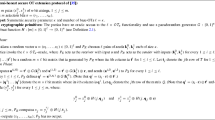Abstract
We focus on generalizing constructions of Batch Single- Choice Cut-And-Choose Oblivious Transfer and Multi-sender k-out-of-n Oblivious Transfer, which are at the core of efficient secure computation constructions proposed by Lindell et al. and the IPS compiler. Our approach consists in showing that such primitives can be based on a much weaker and simpler primitive called Verifiable Oblivious Transfer (VOT) with low overhead. As an intermediate step we construct Generalized Oblivious Transfer from VOT. Finally, we show that Verifiable Oblivious Transfer can be obtained from a structure preserving oblivious transfer protocol (SPOT) through an efficient transformation that uses Groth-Sahai proofs and structure preserving commitments.
Access this chapter
Tax calculation will be finalised at checkout
Purchases are for personal use only
Preview
Unable to display preview. Download preview PDF.
Similar content being viewed by others
References
Abe, M., Fuchsbauer, G., Groth, J., Haralambiev, K., Ohkubo, M.: Structure-preserving signatures and commitments to group elements. In: Rabin, T. (ed.) CRYPTO 2010. LNCS, vol. 6223, pp. 209–236. Springer, Heidelberg (2010)
Abe, M., et al.: Optimal structure-preserving signatures in asymmetric bilinear groups. In: Rogaway, P. (ed.) CRYPTO 2011. LNCS, vol. 6841, pp. 649–666. Springer, Heidelberg (2011)
Belenkiy, M., Chase, M., Kohlweiss, M., Lysyanskaya, A.: P-signatures and noninteractive anonymous credentials. In: Canetti, R. (ed.) TCC 2008. LNCS, vol. 4948, pp. 356–374. Springer, Heidelberg (2008)
Canetti, R.: Universally composable security: A new paradigm for cryptograpic protocols. In: FOCS 2001 (2001), Current Full Version Available at Cryptology ePrint Archive, Report 2000/067 (2001)
Cachin, C., Camenisch, J.L.: Optimistic fair secure computation. In: Bellare, M. (ed.) CRYPTO 2000. LNCS, vol. 1880, pp. 93–111. Springer, Heidelberg (2000)
Canetti, R., Fischlin, M.: Universally composable commitments. In: Kilian, J. (ed.) CRYPTO 2001. LNCS, vol. 2139, pp. 19–40. Springer, Heidelberg (2001)
Camenisch, J., et al.: Structure preserving CCA secure encryption and applications. In: Lee, D.H., Wang, X. (eds.) ASIACRYPT 2011. LNCS, vol. 7073, pp. 89–106. Springer, Heidelberg (2011)
Choi, S.G., Katz, J., Wee, H., Zhou, H.-S.: Efficient, adaptively secure, and composable oblivious transfer with a single, global CRS. In: Kurosawa, K., Hanaoka, G. (eds.) PKC 2013. LNCS, vol. 7778, pp. 73–88. Springer, Heidelberg (2013)
Camenisch, J.L., Stadler, M.A.: Efficient group signature schemes for large groups (extended abstract). In: Kaliski Jr., B.S. (ed.) CRYPTO 1997. LNCS, vol. 1294, pp. 410–424. Springer, Heidelberg (1997)
Crépeau, C., van de Graaf, J., Tapp, A.: Committed oblivious transfer and private multi-party computation. In: Coppersmith, D. (ed.) Advances in Cryptology - CRYPT0 1995. LNCS, vol. 963, pp. 110–123. Springer, Heidelberg (1995)
Dodis, Y., Haralambiev, K., López-Alt, A., Wichs, D.: Cryptography against continuous memory attacks. In: FOCS, pp. 511–520. IEEE Computer Society (2010)
Even, S., Goldreich, O., Lempel, A.: A randomized protocol for signing contracts. Communications of the ACM 28(6), 637–647 (1985)
Green, M., Hohenberger, S.: Universally composable adaptive oblivious transfer. In: Pieprzyk, J. (ed.) ASIACRYPT 2008. LNCS, vol. 5350, pp. 179–197. Springer, Heidelberg (2008)
Goldreich, O., Micali, S., Wigderson, A.: How to play any mental game or a completeness theorem for protocols with honest majority. In: STOC 1987, pp. 218–229. ACM (1987)
Groth, J., Sahai, A.: Efficient non-interactive proof systems for bilinear groups. In: Smart, N.P. (ed.) EUROCRYPT 2008. LNCS, vol. 4965, pp. 415–432. Springer, Heidelberg (2008)
Ghadafi, E., Smart, N.P., Warinschi, B.: Groth-Sahai proofs revisited. In: Nguyen, P.Q., Pointcheval, D. (eds.) PKC 2010. LNCS, vol. 6056, pp. 177–192. Springer, Heidelberg (2010)
Ishai, Y., Kushilevitz, E.: Private simultaneous messages protocols with applications. In: Proceedings of the Fifth Israeli Symposium on Theory of Computing and Systems 1997, pp. 174–183. IEEE (1997)
Ishai, Y., Prabhakaran, M., Sahai, A.: Founding cryptography on oblivious transfer - efficiently. In: Wagner, D. (ed.) CRYPTO 2008. LNCS, vol. 5157, pp. 572–591. Springer, Heidelberg (2008)
Jarecki, S.: Efficient two-party secure computation on committed inputs. In: Naor, M. (ed.) EUROCRYPT 2007. LNCS, vol. 4515, pp. 97–114. Springer, Heidelberg (2007)
Kilian, J.: Founding crytpography on oblivious transfer. In: Proceedings of the Twentieth Annual ACM Symposium on Theory of Computing, pp. 20–31. ACM (1988)
Kiraz, M.S., Schoenmakers, B., Villegas, J.: Efficient committed oblivious transfer of bit strings. In: Garay, J.A., Lenstra, A.K., Mambo, M., Peralta, R. (eds.) ISC 2007. LNCS, vol. 4779, pp. 130–144. Springer, Heidelberg (2007)
Lindell, Y.: Fast cut-and-choose based protocols for malicious and covert adversaries. In: Canetti, R., Garay, J.A. (eds.) CRYPTO 2013, Part II. LNCS, vol. 8043, pp. 1–17. Springer, Heidelberg (2013)
Lindell, Y., Oxman, E., Pinkas, B.: The IPS compiler: Optimizations, variants and concrete efficiency. In: Rogaway, P. (ed.) CRYPTO 2011. LNCS, vol. 6841, pp. 259–276. Springer, Heidelberg (2011)
Lindell, Y., Pinkas, B.: Secure two-party computation via cut-and-choose oblivious transfer. In: Ishai, Y. (ed.) TCC 2011. LNCS, vol. 6597, pp. 329–346. Springer, Heidelberg (2011)
Lindell, Y., Pinkas, B.: Secure two-party computation via cut-and-choose oblivious transfer. J. Cryptology 25(4), 680–722 (2012)
Peikert, C., Vaikuntanathan, V., Waters, B.: A framework for efficient and composable oblivious transfer. In: Wagner, D. (ed.) CRYPTO 2008. LNCS, vol. 5157, pp. 554–571. Springer, Heidelberg (2008)
Rabin, M.O.: How to exchange secrets by oblivious transfer. Technical report, Aiken Compuation Laboratory, Harvard University, TR-81 (1981)
Shankar, B., Srinathan, K., Rangan, C.P.: Alternative protocols for generalized oblivious transfer. In: Rao, S., Chatterjee, M., Jayanti, P., Murthy, C.S.R., Saha, S.K. (eds.) ICDCN 2008. LNCS, vol. 4904, pp. 304–309. Springer, Heidelberg (2008)
Tassa, T.: Generalized oblivious transfer by secret sharing. Designs, Codes and Cryptography 58(1), 11–21 (2011)
Yao, A.C.-C.: How to generate and exchange secrets (extended abstract). In: FOCS 1986, pp. 162–167. IEEE (1986)
Author information
Authors and Affiliations
Corresponding author
Editor information
Editors and Affiliations
Rights and permissions
Copyright information
© 2015 Springer International Publishing Switzerland
About this paper
Cite this paper
David, B.M., Nishimaki, R., Ranellucci, S., Tapp, A. (2015). Generalizing Efficient Multiparty Computation. In: Lehmann, A., Wolf, S. (eds) Information Theoretic Security. ICITS 2015. Lecture Notes in Computer Science(), vol 9063. Springer, Cham. https://doi.org/10.1007/978-3-319-17470-9_2
Download citation
DOI: https://doi.org/10.1007/978-3-319-17470-9_2
Publisher Name: Springer, Cham
Print ISBN: 978-3-319-17469-3
Online ISBN: 978-3-319-17470-9
eBook Packages: Computer ScienceComputer Science (R0)

